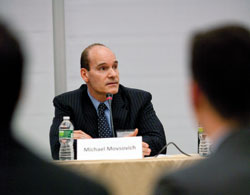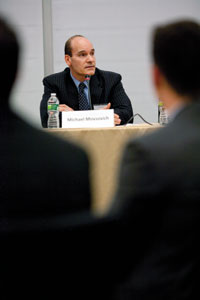Finance grad chose corporate law over a career in business—and he couldn’t be happier
Occasionally, a graduate may be hard-pressed to find a direct link between his or her TCNJ studies and his or her current career. Not so for Michael Movsovich ’86, a senior partner in the New York office of the Kirkland & Ellis law firm.


Occasionally, a graduate may be hard-pressed to find a direct link between his or her TCNJ studies and his or her current career. Not so for Michael Movsovich ’86, a senior partner in the New York office of the Kirkland & Ellis law firm. “All the skills I acquired as a finance undergraduate translate to what I’m doing as a lawyer,” he says.
Movsovich specializes in complex business transactions for private equity firms, such as mergers and acquisitions, IPOs, and debt financing. He credits much of his grounding in corporate finance, and his initial attraction to corporate law, to a business law course at TCNJ and two finance professors, Herbert “Buddy” Mayo and Tom Patrick.
“It was the beginning of the business school, we had extremely small classes, and it was very collegial,” he notes. “Drs. Mayo and Patrick wanted us to do well because that would help build the program. All the professors were good, but those two were rigorous. They challenged us, made finance interesting, and kept it fun,” recalls Movsovich, who has stayed in touch with the professors over the years.
After graduating, Movsovich worked as an investment officer at a regional bank in Princeton for three years, while pursuing an MBA at Drexel University part time. But the job wasn’t a good match; he never got excited about
managing money. While attending law school at the University of Pennsylvania, he leaned toward the business end of law. “I liked thinking about venture capital, private equity, and leveraged buyouts,” he explains. When he joined Kirkland 20 years ago, he wanted to do highly complicated work and challenge himself, and he has done both there. He became a partner in 1998 and serves on several management committees at the firm.
Movsovich recalls a memorable client engagement that spanned several years and illustrates how involved his work can be. He uses two fictional companies to explain. Let’s say private equity firm SavvyBiz, which owns A-1 Computer Company, has retained Kirkland to take A-1 public. Then SavvyBiz sees an opportunity when IBC Computers decides to exit the computer business and market only its consulting services. Once again, it calls on the law firm’s expertise.
IBC spins off its computer division, tax deferred, to its stockholders and agrees to a merger of A-1with the new spin-off, creating IA-PC. SavvyBiz owns significant stock in IA-PC, which now sells both IBC PCs and A-1 PCs. Next, IA-PC decides to exit the old printer businesses of both IBC and A-1. Savvy thinks those businesses would be a good investment, so it offers to exchange its IA-PC stock for that of a new subsidiary of IA- PC, called NewPrinters, that holds the assets of the printer businesses. Kirkland accomplishes that in a tax-deferred split-off transaction.
After the exchange of its IA-PC stock for the NewPrinters stock, SavvyBiz owns 100 percent of NewPrinters and no longer has any interest in IA-PC. Working together, Savvy and Kirkland have completed a series of four complex transactions that resulted in Savvy changing its investment from ownership of a multiline computer company to the ownership of what’s known as a pure play combined printer business, all on a tax-deferred basis. (Non-tax-lawyers: Give yourself an A if you followed all that.)
“That [client engagement] involved every kind of law you can imagine, and highly complicated tax transactions,” Movsovich says.
It also entailed everything this attorney likes about his job.
Posted on June 10, 2013

